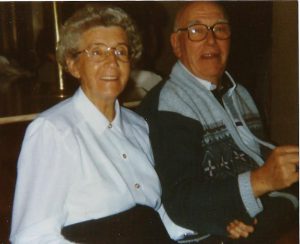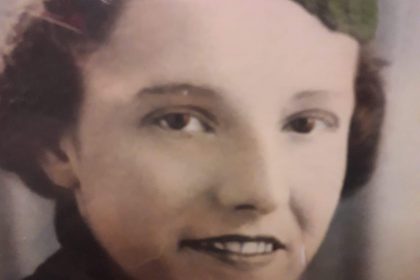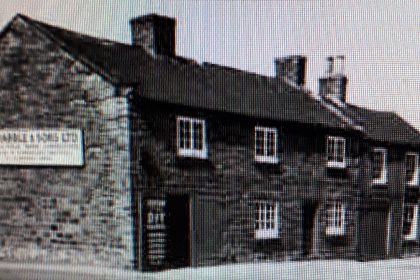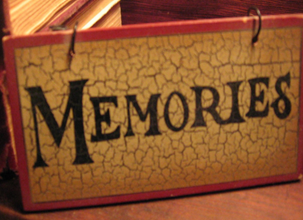 CAN YOU REMEMBER THE DAY WHEN YOU HEARD ABOUT THE WAR BREAKING OUT?
CAN YOU REMEMBER THE DAY WHEN YOU HEARD ABOUT THE WAR BREAKING OUT?
Grandma: “Yes, I know where I was. I was stood on the wall at Dymchurch in Kent. Everyone was thinking, “Gas masks! Gas masks!” You know. That’s when sirens first went for us, that’s when we first heard about it”.
Granddad: “1939, when the war broke out, my brother got married on the Saturday that the war was declared on a Sunday. And when we came back from the reception, he lived down Stone Street, he just went to switch the light on for the first time, and a Special Constable shouted at him, “Put that light out! Put that light out!” (Laughs) Well me brother says, “I’ll put your light out!” You had to be in darkness, but it was the first night, everybody weren’t prepared.”
Grandma: “Well, they were, but it was a new thing, they couldn’t get used to it.”
Granddad: “They had to get blackouts up, hadn’t they then.”
Grandma: “You used to have to buy black material and make a blind.”
Granddad: “Then rations started, everybody was rationed.”
Grandma: “What did we get? Little pat of butter, about two ounce of butter.”
Granddad: “We got a bit extra cheese with being miners. . . .
Grandma: . . .”and a bit of soap” . . . .
Granddad: . . . . “for us, hard-working miners.”
Grandma: “I think we got one egg a week, then, I think when America joined, we got dried egg and that was good. A quarter of tea, once a month and sweets, they were rationed you had to have coupons for sweets.
Granddad: “I used to work down t’pit and also I was in the Home Guard and a night I had to go on duty. Well, I could only go on duty at weekends because I was on nights. You either had to be Home Guard or Fire Watches, didn’t they? Or First Aid.
Grandma: “And there’s meat ration. You were very lucky if you got fresh meat. They used to plonk a can of corned beef, so we used to make a stew with the corned beef, and it used melt into the stew. It used to be tasty. Your vegetables and that. It used to be tasty” . . . .
Granddad: “ . . . and the offal what they used to have, other than your ration of meat, there used to be a queue for them, liver, hearts, things like that.”
Grandma: “Then we started to keep a couple of pigs, didn’t we? And we used to have to send one into the bacon factory and get paid for it and with the other one, they killed it for you, then they used to cure it for you and you had to hang it up.”
Granddad: “Then they cut your rations back, oh no, we had to give a coupon back as we had to give our coupons up.”
Grandma: “Same as sugar. Very little sugar. Then there used to be large families. When the evacuees came, they had large families. Those with large families used to swap with other people, who had plenty of sugar, with families. And that’s how they coped. When it came to jamming season, we used to have to go without sugar, so you could make a bit of jam. And everyone had an allotment and used to grow their own vegetables and then they all started keeping chickens. And pastry, well we used to have a job making pastry until someone hit on the idea of using liquid paraffin, but you didn’t make it often because it physicked you. We used to have Spam fritters.”
Granddad: “And when cigarettes used to come in, into pubs and that, when you used to ask, “Can I have a packet of cigarettes?” They used to say they’d got none, but if you stopped on and had another drink, they used to bring you some up.”
SO DID EVERYONE USED TO HELP EACH OTHER OUT?
Grandma: “Everyone used to help each other out. Never saw anyone go without. We always managed. We used to buy our milk from the farm and there always used to be a lot of cream on it and we used to skim that off, then put your margarine in a jam jar with the cream and if you had a natter with the neighbour, you would sit there shaking this jar and it would mix the cream and your margarine together. Used to make it last, see?
Granddad: “When we got married in 1941, all the family would pool their rations for a do. Wedding cake had no icing on it.”
Grandma: “Yes, nobody would give up their rations for icing as it was seen as an extra luxury.”
WAS IT HARD THAT YOU HAD A BIG FAMILY, OR DID IT MAKE YOUR LIFE EASIER?
Grandma: “Well, it used to be easier if you had a bigger family, as you had extra rations. And they used to help someone who only had two in a family.”
Granddad: “And all heavy workers, all t’miners used to get a bit extra cheese.
Grandma: “And my mum, living in London, used to get stuff on the black-market. She used to send us great big tins of that Spam. Where they got it from, I don’t know. And we used to open it, we used to share it up. Everyone had Spam fritters and they used the dried egg to make them.”
Granddad: “Those we got the money used to fare best, because they used to buy it. When you used to have a drink at a pub, you used to have it at one pub and when t’beer went off, you used to go to another one. Only at weekend though.
YOU WERE IN THE HOME GUARD, WEREN’T YOU?”
Granddad: “When we were at home we used to train 2/3 times a week and go away to train on machine guns.”
Grandma: “Then some silly devil left his bullet in his gun. They had to sleep on the floor for this duty and it accidently went off. Did it go past your head and Frankie Godfrey’s?”
DID SOMEONE TRY TO SHOOT YOU ONCE?
Grandma: “Well, the local gamekeeper . . . .”
Granddad: Well, we were on one of t’Bridle roads in Mosborough, in loneliness, that’s where we had our guard hut. There was a man coming and he’d been to Ridgeway along the Bridle. We keep shouting, “Halt, who goes there?” and he wouldn’t stop. Anyway, in’t finish we said we were going to fire. Anyway he stopped and it were one of the old contemptables from Mosborough, old gamekeeper. He’d been up to Ridgeway, had a pint too much, anyway, he stop and he didn’t know we were on guard there, up the Bridle. Course, we knew him, everybody knew him, we called him, ‘Old Fab’, ‘Old Fab Ashley.’ And a time or two after, we used to say, “Thy were lucky tha knows ‘Old Fab’, he said, “Were thy one of them young buggers?” And we said, “Aye we were!”
Grandma: “Tell it right. When you asked who it was, he said, “Don’t shoot, don’t shoot! It’s Fabian.” He was a character. He was a gentleman, like.”
DID YOU KNOW ANYONE WHO WENT OFF TO WAR?
Grandma: “Well, there were lots of soldiers who went off. There was Frank Godfrey, he was Fleet Air Man, he never came back, he was just reported missing.
Granddad: “There were Wilf Hunt, our cousin, he got killed. But me, I registered, we all had to get registered at 20. And I registered at 23 and half, and I should have gone with the next batch. They used to collect them every six months, they fetched them up to 23’s and I should have gone with the next batch, out of t’pit, ready to go out and join me mates that had gone out of the villages, in Sherwood Foresters. And they stopped them going out of the pits because they couldn’t afford to let ‘em go. Losing production, so I got away with it. But one mate, Fred Green, played football for Torquay, he got convoyed on a Russian convoy, when through five times. Anyway, he got safely back.
Grandma: “And I went into munitions, so I didn’t get called up. I was making caps for fuses when they turned round, ready for the range. They used to be a cap with dials telling how many yards to fire.
Granddad: “When they started with the air raid, they used to come morning and night over London. And they kept missing Sheffield. They used to get on the radio and say, “Where’s that city on wheels?” Gerry air force couldn’t find it. But they found it twice in a week. Thursday, they flattened it then and Sunday night.”
WHERE WERE YOU WHEN THEY BOMBED IT?
Grandma: “I came up the day before.” (She was evacuated from London with her mother and brother,)
Granddad: “Thursday night, I was down the pit, 360 yards down Knoll Pit. They started just as we went down.”
Grandma: “We got bombed out in Bromley and of course, we had to go in this here school. Within a couple of days we were all on a train, we didn’t know where we were going and we ended up at Renishaw, Spinkhill College, then they allocated you to people, who would take refugees in. We finished up in a condemned house at Mosborough. And when the Officer that was in charge used to give you clothing coupons because a lot had come up and had lost everything. Every possession that they had, only what they came up in and were standing up in. And you could go to C & A’s. I went with two girls that up at the same time, Gladys Hardy (Hardy was her surname when she later married) and her sister Joyce and we went in C & A’s in the afternoon and they bombed in at night.
Granddad: “They dropped out of the frying pan and into the fire.”
DID YOU EVERY HAVE THE AIR RAIDS GOING OFF HERE?
Granddad: “Sirens used to go pretty regular, but then the OK was given. No activity. It started over Sheffield on Thursday night, it lasted long enough.”
Grandma: “You could hear it.
Granddad: “But on Sunday night, it started about 9 o’clock, all the pubs were shut, cos we nipped into the British when it had finished. But it lasted long enough because a fog came over, and that stopped Gerry.”
Grandma: “But you could hear it from here, bumping. Sky used to light up. You could hear them going off, then guns firing on them. But when I was in London, everybody used to go in, it wasn’t safe to stop out. You knew by the sound of the plane whether it was a Gerry or your own. And then when they used to start with Doodle Bugs, they were a bomb that flew on its own, and then it’s engine cut out, and then it came down, but it used to glide and go and go a couple of miles before it fell. So you could hear it coming, you knew it. And as soon as it cut out, everybody used to hide under their tables, because you knew it was going to come down when the engine stopped. It was a terrible thing. They then started to shoot it down. They also used to drop incendiary bombs and that used to light things up and set them on fire. Then they used to drop landmines, but they came down in parachutes, and they were massive things. They dropped one once on our local cemetery, bones all over the road. I can remember going to the pictures the next day and they were clearing them up.”
Granddad: “Entertainment in the pubs. They used to sing, “Hang out the washing on the Seigfreid line.”
Grandma: “There were no television in them days, so everyone had to make their own entertainment. Used to have get together parties. When you went to a party you used to take a little bit with you so not to use up theirs.”
Granddad: “Well, you had to do, nothing went spare, only them with money and those on the Black Market had plenty.”
DID YOU USED TO PLAY FOOTBALL IN THE WAR?
Granddad: “Ah, but there were no English cup plays, just minor leagues, and then there were RAF teams, until they were called up to have to go abroad. Local teams played, in fact, in the wartime, both local cups that we used to play for, in wartime, we won them both, but we didn’t get no medals, we just got a photograph of the team.”
Grandma: “Well, as I say, we had to make our own entertainment. And clothes, well they were on rations. You used to have coupons to go and get clothes. When your Edith got married, we all had to give her a couple of coupons for her to get married.”
Granddad: “Ah, you used to get, you were allowed one orange. And do you know, for nearly all war years, kids didn’t know what a banana was when they came. We did, but the kids what got to be three or four years old, they didn’t know what to do with it, did they?”
Grandma: “You used to, when you went to the Clinic, get a bottle of orange concentrate and that used to be nice on pancakes. When we made orange juice, it used to be for the babies, like and young children.
Granddad: “There were plenty of cod liver oil for youngsters.”
Grandma: “And rosehip syrup, that used to be lovely, as they didn’t get fruit.”
WHEN THEY CALLED THE END OF THE WAR. HOW DID YOU CELEBRATE IT?
Grandma: “Oh, we had a bonfire in the garden didn’t we?”
Granddad: “And street parties. Big rows of house, we used to have them in the back yard.”
Grandma: “To say things were rationed, it was surprising where things came from. There was always plenty for the kids, buns and sandwiches.
Granddad: “All flags out of the window, everybody had a flag out of the window, nearly everyone anyway”
Grandma: “What time was it announced? Weren’t we in bed and they knocked us up, to tell us the war was over?
Granddad: “Ah, VE day.”
Grandma: “I’m sure it were, but it were 58 years since.”
Granddad: “When the war was over proper, no one had to go to work, it were an understood holiday. Because there were only me going down early. We went to bed early as I had to get up early and they said, “It’s drawing to a close.”. I went down and there was only me down there. I couldn’t understand it. Quarter to five in the morning. I was stood there an hour. When it came to, war was over.”
Grandma: Well, I think they knocked us up and said, “Did you know the war’s over. So it was announced more or less at evening time. We used to have to get up at four in the morning.
Granddad: “Aye, we used to be listening to old Churchill, didn’t we?”
Grandma: “Promising us everything.”
Granddad: “We will fight them on the beaches. It’s no wonder they didn’t blow up the Houses of Parliament and them places. There was a plane ready to take ‘em to Australia.”
Grandma: “They had all big bunkers for the big wigs. There was a big bunker, up at the top of the Manor, where that big army base is.”
Granddad: “There were numerous, many had them Anderson shelter things, corrugated iron sheeting. “
Grandma: “Every house got one of those, and they used to cover them with soil and make them grow flowers on them.”
Granddad: “When the lads were coming back, when war was over, they all came back with a trilby and a cheap demob suit.”
Grandma: “And then there was no work for them.”
Granddad: “They used to say, “Tha’ can have my hat if tha wants it.”
HOW LONG HAD YOU BEEN MARRIED WHEN THE WAR STARTED?
Granddad: “1941 when we got married.”
Grandma: “We got married during the war.”
Granddad: “Boxing Day 1941.”
Grandma: “Gonna say, there was no icing on the cake, no flowers, no photographs.”
Granddad: “We had a reception in the local club.”
SO WHEN YOU CAME OVER IN 1939 AND YOU MET GRANDDAD IN A PUB?
Granddad: “Aye, Bluebell. Well, there wasn’t any electric.”
Grandma: “It was candles. It was very miserable.”
Granddad: “Well, we had such bad news, we had to leave. Had to look on the bright side of everything. There was no good grumbling, because you couldn’t alter things.
This is a transcript of a recorded interview conducted by Lisa Stocks, of her Grandparents, Joseph and Frances Waller. For a school project.
Credit to Carol Stocks (nee Waller) who typed these memories up. February 2018







